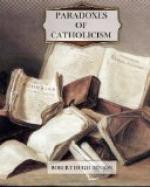Is it any wonder then that, now and again, some chosen child of hers catches a mirrored glimpse of what she herself beholds with unveiled face; that some Catholic soul, now and again, chosen and called by God to this amazing privilege, should suddenly perceive, as never before, that God is the one and only Absolute Beauty, and that, compared with the contemplation of this Beauty—which contemplation is, after all, the final life of Eternity to which every redeemed soul shall come—all the activities of earthly life are nothing; and that, in her passion for this adorable God, she should run into a secret room and shut the door and pray to her Father Who is in secret, and so remain praying, a hidden channel of life to the whole of that Body of which she is a member, an intercessor for the whole of that Society of which she is one unit? There in silence, then, she sits at Jesus’ feet and listens to the Voice which is as the sound of many waters; in the whiteness of her cell watches Him Whose Face is as a Flame of Fire, and in austerity and fasting tastes and finds that the Lord is gracious.
Of course this is but madness and folly to those who know God only in His Creation, who imagine Him merely as the Soul of the World and the Vitality of Created Life. To such as these earth is His highest Heaven and the beauty of the world the noblest vision that can be conceived. Yet to that soul that is Catholic, who understands that the Eternal Throne is indeed above the stars and that the Transcendence of God is as fully a truth as His Immanence—that God in Himself, apart from all that He has made, is all-fair and all-sufficient in His own Beauty—to such a soul as this, if called to such a life, there is no need that the Church should declare explicitly that the Contemplative Life is the highest. She knows it already.
(ii) The First Great Commandment of the Law, then, is inevitably followed by the Second, and the Catholic interpretation of the Second is thought by the world, which understands neither, to be as extravagant as her interpretation of the First.
For this Divine Church that knows God is also a Human Society that dwells among men, and since she in herself unites Divinity and Humanity, she cannot rest until she has united them everywhere else.




